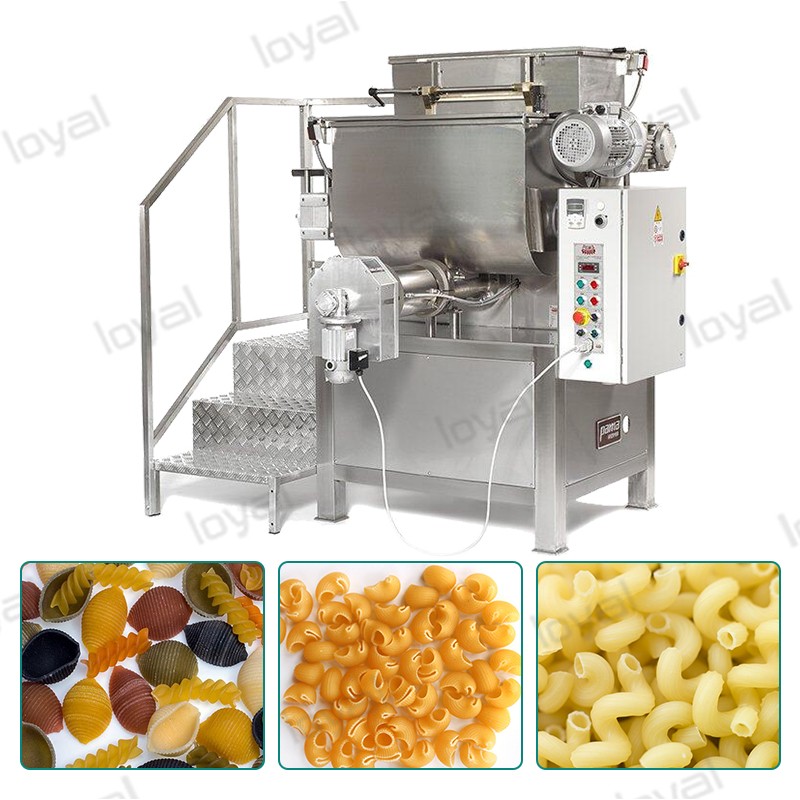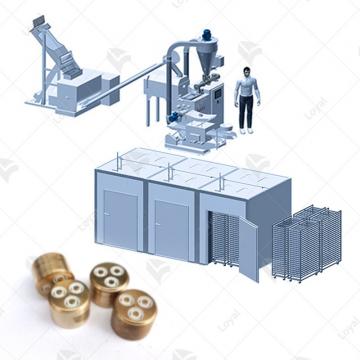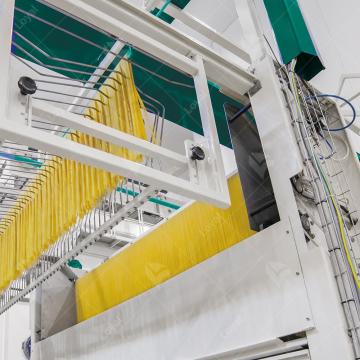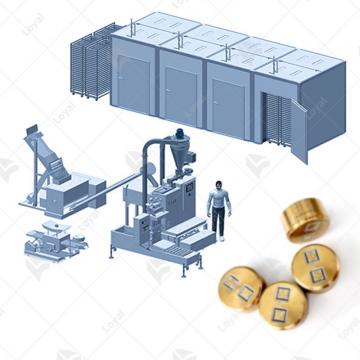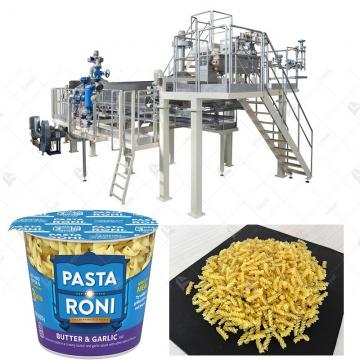Fully Automated Macaroni Making Process: High-Efficiency Equipment Unveiled
Fully Automated Macaroni Making Process: High-Efficiency Equipment Unveiled
manufacturing.Shandong Loyal Industrial Co., Ltd. has incorporated advanced technologies from Germany's Buhler and Italy's GEA in the production of its macaroni

Evolution of Macaroni Making Process
The evolution of macaroni making is a journey that traverses traditional methods to the forefront of innovation. Traditional techniques are juxtaposed with the imperative for innovation, leading to the emergence of fully automated systems. This section provides insights into how the macaroni making process has evolved, laying the foundation for a new era defined by efficiency advancements.
Unveiling High-Efficiency Equipment
Delving into the heart of the matter, this section takes a closer look at the intricacies of high-efficiency equipment driving the fully automated macaroni making process. The precision of pasta extruders, the finesse of mixing systems, and the integration of advanced technologies are unveiled. Notable brands such as Barilla, De Cecco, Creamette, San Giorgio, and Great Value stand as pioneers in embracing this technology, contributing to the efficiency and consistency of macaroni production.
The pasta extruder, a critical component of high-efficiency equipment, has witnessed remarkable innovations. Advanced extrusion technologies ensure precise shaping and cutting, enhancing the overall quality and uniformity of macaroni products. This innovation has become a hallmark of modern macaroni making.
High-efficiency is not only about speed but also about precision. Modern macaroni production relies on cutting-edge mixing systems that ensure the perfect blend of ingredients, leading to a consistent and superior product. This section delves into the advancements in mixing technology that have revolutionized the macaroni making process.
The synergy of automation technologies plays a crucial role in achieving high-efficiency in macaroni production. Robotics, artificial intelligence, and data analytics contribute to seamless operations, reducing human intervention, and optimizing the entire macaroni making process. This subsection explores how these technologies are integrated into the equipment to enhance efficiency.
Benefits of Full Automation
Building on the foundation laid by high-efficiency equipment, this section highlights the myriad benefits derived from a fully automated macaroni making process. Increased productivity, maintained quality standards, and operational cost reductions emerge as key advantages. Industry experts and leaders affirm these benefits, emphasizing the transformative impact on the entire macaroni production industry.
Future Trends and Innovations
Looking forward into the future of macaroni making, this section speculates on upcoming trends and innovations that will shape the industry. The integration of artificial intelligence, robotics, and data analytics is expected to play a pivotal role in further enhancing the macaroni making process. Advanced algorithms will optimize production parameters, predict maintenance needs, and contribute to a more sustainable and efficient macaroni manufacturing ecosystem. Additionally, the adoption of smart sensors and IoT (Internet of Things) devices is poised to bring about real-time monitoring and control, ensuring precision and reducing waste in the production line.
Artificial Intelligence (AI) is set to become a driving force in macaroni production, offering predictive analytics to optimize various aspects of the macaroni making process. This subsection explores how AI algorithms will continuously analyze data, enabling manufacturers to make informed decisions, streamline operations, and maximize efficiency.

The integration of robotics in macaroni making is a transformative trend. Robots will take on more intricate tasks, enhancing precision and speed in the production line. From automated packaging to intricate cutting, this section delves into how robotics is set to revolutionize the macaroni manufacturing landscape.
Sustainability is an ever-growing concern, and the macaroni production industry is not exempt. Innovations in sustainable materials, energy-efficient machinery, and eco-friendly packaging are expected to take center stage. The pursuit of environmentally conscious practices in the macaroni making process will become a defining trend.
Case Studies: Success Stories in Fully Automated Macaroni Making
This section unveils real-world success stories of companies that have embraced fully automated systems in the macaroni making process. Examining brands such as Barilla, De Cecco, Creamette, San Giorgio, and Great Value, we explore the challenges faced, strategies implemented, and the remarkable outcomes achieved. These case studies provide tangible evidence of how high-efficiency equipment and automation have not only increased productivity but also elevated the overall quality of macaroni products.
Barilla's journey into automated macaroni making is showcased, emphasizing how their commitment to precision and efficiency has positioned them as industry leaders. Insights into the specific technologies implemented and the resulting benefits provide a comprehensive view of Barilla's success in embracing automation.
De Cecco's case study delves into how this renowned brand has seamlessly blended tradition with innovation in the macaroni making process. The adoption of high-efficiency equipment and automated systems has not only preserved their legacy but propelled them into a new era of excellence.
Creamette's success story focuses on how they redefined efficiency through the integration of fully automated macaroni making. Key milestones, challenges overcome, and the impact on their product line highlight Creamette's journey toward becoming a symbol of modern macaroni manufacturing.
San Giorgio's case study narrates the tale of technological transformation, showcasing how they embraced cutting-edge equipment to meet the demands of the modern market. The section explores the specific technologies integrated, their adaptation strategies, and the resulting success.
Great Value's case study provides insights into how this brand navigated the challenges of automation to ensure quality in their macaroni products. It sheds light on the balancing act between efficiency and maintaining the highest standards in macaroni production.

Overcoming Challenges
As the macaroni industry transitions towards fully automated processes, certain challenges must be addressed. One significant obstacle is the need for a skilled workforce capable of managing and maintaining the sophisticated high-efficiency equipment. Training programs and collaborations with educational institutions play a pivotal role in overcoming this challenge, ensuring that operators are well-versed in the intricacies of automation.
Another challenge is the integration of fully automated systems into existing macaroni production facilities. This can be a complex process, requiring meticulous planning to minimize disruptions. Collaborations with automation experts and thorough feasibility studies are essential to navigate this challenge successfully.
Conclusion
In conclusion, the fully automated macaroni making process, coupled with high-efficiency equipment, marks a revolutionary phase in the industry. The evolution from traditional methods to advanced automation has brought about unprecedented benefits, including increased productivity, consistent product quality, and reduced operational costs. As the industry looks towards the future, with ongoing innovations and a commitment to sustainability, the fully automated macaroni making process stands as a testament to progress and excellence.
FAQs: Common Questions about Macaroni Making Process
1. Q: How can the industry address the need for a skilled workforce in automated macaroni production?
A: Training programs and collaborations with educational institutions are essential to ensure that operators are well-prepared to manage and maintain high-efficiency equipment in fully automated processes.
2. Q: What challenges are associated with integrating fully automated systems into existing macaroni production facilities?
A: The integration process can be complex and disruptive. Collaborations with automation experts and thorough feasibility studies are crucial to navigate this challenge successfully.
3. Q: What benefits does the fully automated macaroni making process bring to the industry?
A: The benefits include increased productivity, consistent product quality, and reduced operational costs. The adoption of automation represents a transformative phase in macaroni production.

